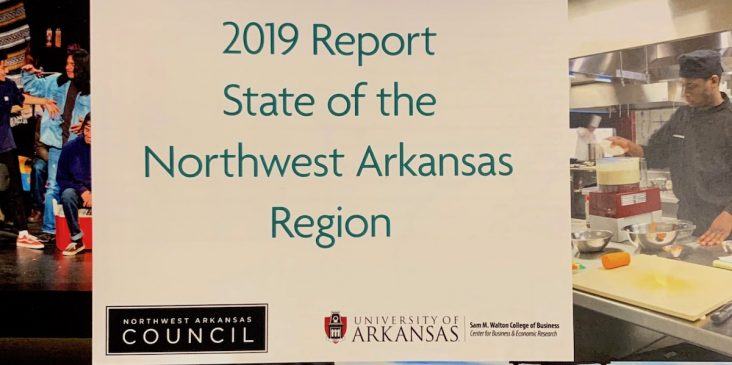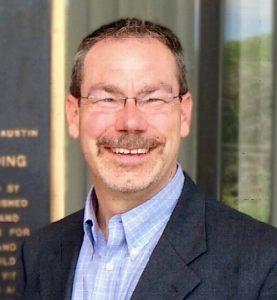Austin firm outlines plan for future growth in Northwest Arkansas
by November 5, 2019 5:40 pm 2,523 views

Northwest Arkansas has a strong economic foundation and its growth continues to outpace the rest of the state and much of the nation, but that is not enough to guarantee a prosperous future, according to Greg Pogue, executive director for Austin-based think tank IC² Institute at the University of Texas.
Pogue and his team spent more than a year assessing Northwest Arkansas’ economic and entrepreneurial growth potential by visiting the region seven times and engaging with dozens of groups to assess areas that need more work.
Pogue was the keynote speaker at the 2019 State of the Region luncheon held in Lowell on Tuesday (Nov. 5). He shared some of the findings from his report and the roadmap the IC² Institute team had shared with the Northwest Arkansas Council before Tuesday’s event. He said the goal of the Walton Family Foundation in funding the initiative was to assess the policies, players and programs already in place and to engage in pilot or collaborative programs in entrepreneurship linking Austin and Northwest Arkansas, as well as to develop a nationally distinctive strategy for regional entrepreneurship.
“This region has a rich tradition of entrepreneurship, but despite a history of iconic examples of world-changing entrepreneurs like Sam Walton and a tier-one public research institution, a nationally competitive entrepreneurial ecosystem has not evolved naturally in Northwest Arkansas,” Pogue said.
CHALLENGES TO GROWTH
He said there are numerous outside forces all regions face that can hinder growth. Without constant planning and execution, cities and regions can fall behind other areas with strategic and targeted efforts. Some of the issues include changing workforce and varying values of the workforce, intense competition for talent, a greater rift between the haves and have-nots and constrained access to capital for startup and spin-off activity.

He said all regions face these issues, but some will grow in spite of them. Pogue said Northwest Arkansas faces some internal issues that need addressing. He said the tight talent pool, particularly in technology, smaller overall labor force numbers, lower educational attainment and a low proportion of self-employed proprietors relative to peer communities are all opportunities for the region to improve.
Pogue’s team also interviewed people who have lived in the region for years and those interested in moving to the region. The research indicated the groups were looking for only a few of the same things and had different ideas about values. For instance, those who’ve been here saw the region’s values as being broadminded, equality and exciting life experiences, while those looking to come here were seeking happiness, intellect, ambition and imagination. He said those living here see the region as a stable place and those looking to come here are expecting excitement and social experiences.
He said Northwest Arkansas has encouraged entrepreneurship and is somewhat generous with funding programs, but there are factors hindering entrepreneurial ecosystem development.
“The focus on local life and this fractured polycentric region has created silos and some non-lateral career pursuits. The people in this region often commute several miles to work and when they get home they don’t want to travel more than seven miles for anything. I don’t know where the seven miles came from, but that is what the majority of people told us,” Pogue said.
He said the stable economy and comfortable lifestyles have created a population that’s uncomfortable with a risky, chaotic lifestyle of entrepreneurship. He said the region must do a better job retaining students and younger people and that requires better alignment with their goals and ambitions. Pogue said alignment with younger generations is poor.
ROADMAP OUTLINE
Pogue said the recommendation for the region is to innovate again and return to its roots and follow the advice of Sam Walton who said: “I seek opportunity – not security. I do not wish to be a kept citizen, humbled and dulled by having the state look after me. I want to take the calculated risk; to dream and to build, to fail and to succeed.”
He said some progress is being made with the addition of a new data science degree to be offered at the University of Arkansas in the spring of 2020. He said enrolling students is not enough, and the region must ensure the students have a place to work and opportunities for lateral growth without having to leave the region once they graduate. He said Arkansas must keep its younger population and educate them if it is ever to create a robust entrepreneurial ecosystem.
“One thing that has still not been figured out is ‘What’s for dinner?’ and that is a strong suit for Northwest Arkansas. The region is also the ground central for brick-and-mortar and fresh foods in a way Amazon can never achieve. Innovating and building on these roots makes sense,” he said.
Pogue said the UA must be the center for directing and facilitating entrepreneurial activity. He said efforts have been fragmented and that does not bode well for developing a natural entrepreneurial ecosystem.
He said two clusters of activity – food/technology, and retail/ data science/logistics – benefit from the university and business communities looking for synergies and engagement. Pogue said key milestones to address regional gaps include new enterprise funding access, improved university-industry collaboration, building and sustaining the youthful workforce, and increasing regional collaboration.
He said startup funding has to improve and that can be facilitated with more engagement between the university and industry. He said the region also will need to build on increasing the number of innovation centers that service the key industries. He said Tyson Foods and J.B. Hunt have already placed innovation hubs in the region and Walmart has committed to building a new corporate campus. The next step is to build and sustain the needed workforce on a regional level.
AUSTIN’S SUCCESS
Pogue said it took a plan and several years for Austin to get there. The idea of Austin becoming a regional technology manufacturing center was first coined by the University of Texas and city leaders in 1971. Then in 1983, DELL, MCCC and MootCorp launched a business plan competition for manufacturing technology and design. Just six years later, the Austin Technology Incubator was born and it has become the engine that grows and retains students in Austin. He said by 1992, Austin formed tech councils and the Texas Capital Funding Network for financing startups. By 2010, Austin had become one of the best places in the U.S. to start a business.
“In Austin, we like to say we scale tacos and technology. From the Torchy’s Tacos and Chuy’s explosive growth to Whole Foods and the high-tech scene known as Silicon Hills, Austin scales traditional businesses,” Pogue said.
He said no city wants to be the next Dallas surrounded by a dozen suburbs that are all the same. He said Northwest Arkansas is several cities with their own identities and plenty of traditional businesses that could be scaled if the right support is given from an entrepreneurial ecosystem.
The economic benefits of pulling off the task would be huge, according to Mervin Jebaraj, director of the Center for Business and Economic Research in the Sam M. Walton College of Business and the University of Arkansas. Jebaraj spoke on the slowing growth patterns the region has experienced through 2018 and the first half of 2019. He said consumers are still spending, employment is full and wages are growing, but so are home prices, rent and the cost of childcare for families – which keeps young mothers out of the workforce.
Jebaraj said the region is growing by about 1,000 people per month. He said there remains a skills gap between those looking for work and the open positions at area firms.
